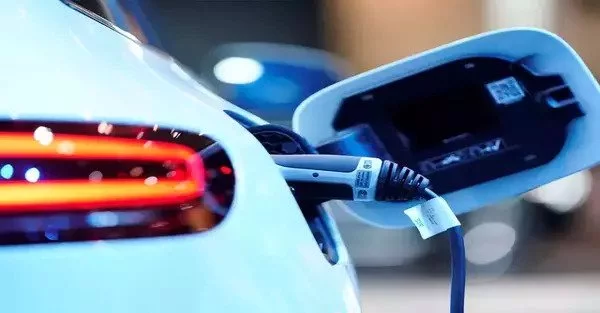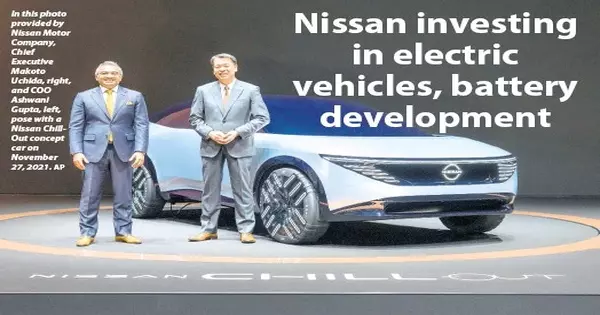Nissan announced Friday that it is collaborating with NASA on a new type of battery for electric vehicles that claims to charge faster and be lighter while remaining safe.
According to Nissan, the all-solid-state battery will replace the lithium-ion battery now in use for a product launch in 2028 and a pilot plant launch in 2024.
The all-solid-state battery is sufficiently stable for usage in pacemakers. It will be about half the size of the existing battery when done, and it will charge in 15 minutes rather than a few hours.
According to Corporate Vice President Kazuhiro Doi, the collaboration with the US space program as well as the University of California, San Diego, entails the testing of various materials.
He explained that “NASA and Nissan both require the same type of battery.”

Nissan and NASA are using a computerized database known as the “original material informatics platform” to test various combinations to find what works best among hundreds of thousands of materials, according to Doi.
The goal is to avoid using costly materials, such as rare metals, which are required for lithium-ion batteries.
Although the battery technology is new, Nissan is relying on its previous expertise with the Leaf electric car, which debuted in 2010 and has sold more than half a million units worldwide, according to Doi and other company officials.
According to them, there have been no major traffic accidents involving the Leaf battery, and some aspects of the technology, such as battery cell lamination, are still prevalent.
Other automakers are working on all-solid-state batteries, including Toyota Motor Corp. of Japan, Volkswagen of Germany, Ford Motor Co., and General Motors Co. of the United States.
GM and Honda Motor Co., a Japanese carmaker, recently announced that they are collaborating on next-generation electric vehicles.
Nissan Executive Vice President Kunio Nakaguro, on the other hand, claimed the company is incredibly competitive and that the battery it is developing has the potential to be “a game-changer.”
Concerns about the usage of fossil fuels contributing to climate change and pollution are driving interest in electric vehicles. Players in the EV market, including Tesla and Waymo, are also expanding, and competition is heating up.
Nissan Motor Co., located in Yokohama, has been eager to put the former rockstar executive Carlos Ghosn’s crisis behind it. He was arrested in Japan in 2018 on multiple financial misconduct allegations, but he eluded extradition in late 2019 and currently resides in Lebanon, a country of his ancestors with no extradition treaty with Japan. He claims to be blameless.
Nissan’s electric vehicle program was pioneered by Ghosn, who managed the firm for two decades and also created the March subcompact and Infiniti premium models.
Nissan announced on Monday that it will invest 2 trillion yen ($17.6 billion) over the next five years in developing a more affordable and powerful battery to expand its electric vehicle fleet.
Makoto Uchida, the company’s CEO, stated that 15 new electric vehicles will be available by fiscal 2030. According to Uchida, Nissan Motor Co. is aiming for a 50 percent “electrification” of its model lineup as part of its “Nissan Ambition 2030” long-term plan.Other than electric vehicles, electrified automobiles include hybrids and other ecologically friendly versions.
According to Uchida, the work is primarily focused on electric vehicles in order to reduce emissions and suit the needs of various clients. Nissan will also reduce carbon emissions at its factories, according to him.
The firm has been battling to move forward from the crisis surrounding its former Chairman, Carlos Ghosn. After being transferred to Japan by French alliance partner Renault, Ghosn, who led Nissan for two decades, was arrested in Tokyo in 2018 on multiple financial misconduct accusations.
Uchida initially avoided mentioning the controversy, instead referring to “previous mistakes” at Nissan that he promised would not be repeated.
Nissan is extremely competitive and that the battery it is developing promises to be “a game-changer. Both NASA and Nissan need the same kind of battery,”
Nissan Executive Vice President Kunio Nakaguro
Nissan’s “electrification” is based on the development of a new ASSB, or all solid state battery, that the company calls “a breakthrough” because it is cheaper and produces more power than current batteries.
Because the batteries can be smaller, electric powertrains can be more easily utilised in trucks, vans, and other heavy vehicles. According to Nissan, the ASSB will be in mass production by 2028.
According to Uchida, the cost of electric vehicles will fall to levels comparable to ordinary gasoline cars as a result of battery improvements.
He stated, “Nissan has emerged from a crisis and is ready to make a fresh start.”
In the face of increased concern about climate change and sustainability, all major manufacturers, including Nissan’s Japanese rival, Toyota Motor Corp., are working on electric vehicles. More safety features are also being demanded by global customers.
Nissan is hiring 3,000 engineers, according to Uchida, to improve its research, which includes digital technologies for vehicles.
Nissan, based in Yokohama, Japan, has recently been hit by a computer chip shortage that has impacted all automakers as a result of chip factory lockdowns and other steps to battle the coronavirus epidemic.
After two years of losses, the creator of the Infiniti luxury vehicles, the Leaf electric vehicle, and the Z sportscar is forecasting a return to profitability for the fiscal year ending March 2022.





